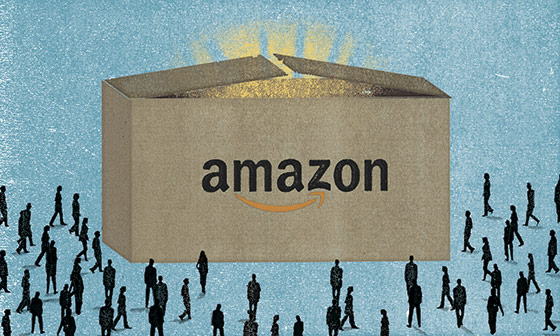The useful imponderability of Amazon, America’s new most reputable company.
 |
Illustration by Oliver Munday
|
Most companies want you to know who and what they are. They spend a ton on branding to get that message nailed down and drilled into the mass brain. Google has taught us to think in terms of search; Apple in terms of lovely interfaces. But what is Amazon? Ostensibly, it’s a retail company. It sells books. It owns Zappos. But it also manufactures the Kindle. Oh, and it sells advertising space on the web to other companies. And it’s a publisher, with a literary imprint (New Harvest) run by a fine editor named Ed Park. And a streaming service for music, movies, and TV shows, while also renting data storage to competing streaming services, including Netflix. Amazon is an elephant by design, and we’re all blind men. It may not even be an elephant; it could be five. The company notoriously runs its warehouses along rigidly Taylorist lines, with employees racing from spot to spot, fetching you that copy of Nickel and Dimed or The Wretched of the Earth as clocks tick. It undercuts indie shops by overnighting orders to locavores. Yet Amazon—not Apple, not Google—now has the best reputation of any big U.S. corporation, according to Harris Interactive. It is a neat trick.
Amazon is good at sorting and ranking things—we understand that. It knows exactly how many boxes of diapers my kids have ever used. It knows every book I’ve considered. It’s also clear that Amazon doesn’t care about what it sells; it just cares about the selling. To Amazon, a book isn’t really a book. It’s the result of a database query that Amazon will seamlessly transmit over its Whispernet or via USPS to your doorstep, if that’s still your thing. To the shopper, Amazon, with its records of browsing and buying, is not a store nor a website, but more like a ghost limb, for grabbing whatever is needed or wanted.
Perceptions grow even fuzzier if you sign up for Amazon Web Services, Amazon’s cloud computing platform. The basic deal is: Amazon has a bunch of computers; you can rent and configure them, by the thousands if necessary. One percent of all North American Internet traffic runs through the company’s servers. As people put more of their digital stuff on the cloud, and onto Amazon’s cloud specifically, they become on some level not just customers of the company but part of it.
Back in 1998, when Amazon was just a classic Internet company, full of bits and vinegar, it got into some scrum with Barnes & Noble (more would follow) and issued a press release saying: “Goliath is always in range of a good slingshot.” Real talk! “Your company,” responded Barnes & Noble, “is now worth more than Barnes & Noble, Borders, and all of the independent booksellers combined.” Amazon replied with a memorable one-word press release: “Oh.” It’s not so puckish anymore, because it doesn’t have to be.
“Everything about them,” said one indie publisher of Amazon in a Salon article, “is still evil.” But that view is countered by people like Will Wiles, who took to the Huffington Post to describe the process of publishing his novel, Care of Wooden Floors, with New Harvest. “Ascendant companies always seem most threatening,” he wrote, “at the moment when they’re becoming indispensable parts of the scenery of an industry.” He had reason to show his loyalty, of course. But consider: When he was promoting his book after the birth of a child, Amazon did something that few publishers would. They sent him a box of diapers.
No comments:
Post a Comment